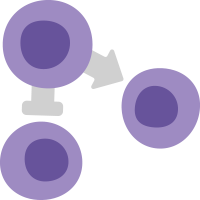
Immune Regulation News
Immune Regulation News is an online resource covering research into the regulation, suppression, and modulation of the immune system.
Regulatory T Cells Limit Age-Associated Retinal Inflammation and Neurodegeneration
[Molecular Neurodegeneration] Investigators evaluated neuroretinal degeneration, gliosis, subretinal space phagocyte infiltration, and retinal pigmented epithelium morphology through immunofluorescence analysis.
Single-Cell Sequencing Reveals Distinct Immune Cell Features in Cutaneous Lesions of Pemphigus vulgaris and Bullous Pemphigoid
[Clinical Immunology] Scientists performed single-cell RNA sequencing and single-cell VDJ sequencing to generate transcriptional profiles for cells and T/B cell clonetype in skin lesions of bullous pemphigoid and pemphigus vulgaris.
Proinflammatory Phenotype of B10 and B10pro Cells Elicited by TNF-α in Rheumatoid Arthritis
[Annals Of The Rheumatic Diseases] TNF-α was a key determinant for B10 cells. TNF-α elicited the proinflammatory feature of B10 and B10pro cells by downregulating IL-10, and upregulating interferon-γ and IL-17A.
Hudson Institute Bolsters Inflammation Research with New Hires
[Hudson Institute of Medical Research (Mirage News)] Director and CEO Professor Elizabeth Hartland announced that Professor Carl Walkley and Dr Sophia Davidson will join the Institute's Centre for Innate Immunity and Infectious Diseases (CiiiD) as Research Group Heads, bringing impressive resumés and exciting research opportunities with them.
Professor Graham Ogg Receives Wellcome Discovery Award with International Team
[Radcliffe Department of Medicine] A team led by Professor Graham Ogg, Deputy Director of the MRC Translational Immune Discovery Unit and Leader of the Translational Dermatology Unit, alongside Professor Jamie Rossjohn, Professor Branch Moody, Professor Muzlifah Haniffa, and Professor Gurdyal Besra, have received a Wellcome Discovery Award to investigate how immune cells contribute to inflammation.
Functional CRISPR Screens in T Cells Reveal New Opportunities for Cancer Immunotherapies
[Molecular Cancer] Investigators bridge the gap between discovering element genes to a specific process of T cell activities and apprehending these genes in the global T cell life cycle, deepened the understanding of T cell biology in tumour immunity, and outline CRISPR screens resources that might facilitate the development and implementation of cancer immunotherapies in the clinic.
Tertiary Lymphoid Structural Heterogeneity Determines Tumour Immunity and Prospects for Clinical Application
[Molecular Cancer] The authors explore the dynamic interactions among T and B cell subpopulations of varying phenotypes that contribute to the structural and functional diversity of TLS, examining both existing and emerging techniques for TLS imaging and induction, focusing on cancer immunotherapies and biomaterials.
Immunogenic Material Vaccine for Cancer Immunotherapy by Structure-Dependent Immune Cell Trafficking and Modulation
[Advanced Materials] Scientists manipulated the immunopotentiator manganese into six differing structures that resemble the architectures of two types of pathogens. They revealed that innate immune cells accurately sense and respond to the architectures, of which two outperformed material candidates showedhigher competence in creating local pro-inflammatory environment with promoted innate immune cell influx and stimulatory effects on multiple subsets of dendritic cells.
Tumor-Targeted Therapy with BRAF-Inhibitor Recruits Activated Dendritic Cells to Promote Tumor Immunity in Melanoma
[Journal For Immunotherapy Of Cancer] Scientists investigated therapy-mediated immunological alterations in the tumor microenvironment and tumor-draining lymph nodes in the D4M.3A preclinical melanoma mouse model by using high-dimensional multicolor flow cytometry in combination with multiplex immunohistochemistry.
Organoids as a Tool to Study Homeostatic and Pathological Immune–Epithelial Interactions in the Gut
[Clinical & Experimental Immunology] Researchers provided an overview of how intestinal organoids are being co-cultured with immune cells leading to substantial advances in our understanding of immune–epithelial interactions in the gut.
Spatial Distribution of Tumor-Associated Macrophages in an Orthotopic Prostate Cancer Mouse Model
[Pathology and Oncology Research] Researchers examined the spatial-temporal dynamics of three different immune cell types infiltrating tumors using QuPath image analysis software. Immunohistochemistry staining revealed that F4/80+ tumor-associated macrophages were the most abundant immune cells in all groups, irrespective of time or treatment.
Respiratory Complex I Regulates Dendritic Cell Maturation in Explant Model of Human Tumor Immune Microenvironment
[Journal For Immunotherapy Of Cancer] Scientists established a patient-derived explant culture model of breast cancer, which retained the immune contexture of the primary tumor, recapitulating cytokine profiles and CD8+ T cell cytotoxic activity.
For over a decade, Immune Regulation News has been keeping the scientific community up-to-date with the latest research and reviews related to immune regulation. Key research areas covered include the roles of regulatory T cells (Treg cells) in autoimmunity and self-reactivity, as well as immune response to disease, transplantation and cancer. We also provide vital updates on the latest jobs and upcoming events in the field of immunology.

 Cancer Stem Cell News
Cancer Stem Cell News Cell Therapy News
Cell Therapy News Dermal Cell News
Dermal Cell News Endothelial Cell News
Endothelial Cell News ESC & iPSC News
ESC & iPSC News Extracellular Matrix News
Extracellular Matrix News Hematopoiesis News
Hematopoiesis News Hepatic Cell News
Hepatic Cell News Human Immunology News
Human Immunology News Immune Regulation News
Immune Regulation News
 Intestinal Cell News
Intestinal Cell News Mammary Cell News
Mammary Cell News Mesenchymal Cell News
Mesenchymal Cell News Muscle Cell News
Muscle Cell News Neural Cell News
Neural Cell News Organoid News
Organoid News Pancreatic Cell News
Pancreatic Cell News Prostate Cell News
Prostate Cell News Pulmonary Cell News
Pulmonary Cell News
